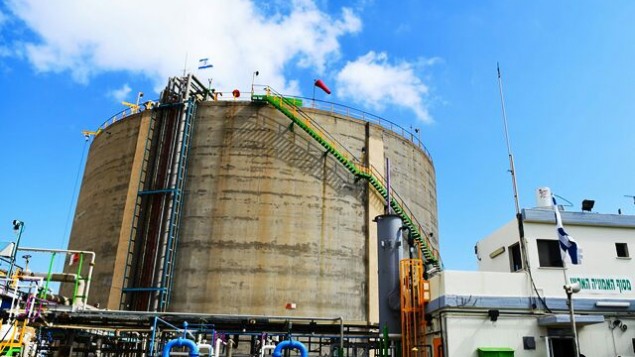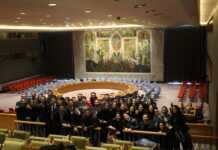
By James. J Marlow
After a report concluded that a terrorist strike on ships carrying the chemical ammonia could kill hundreds of thousands, a judge has ordered the Haifa ammonia tank to be shut down by 1st April.
But the drama continues after the Haifa Chemicals Group, which operates the 12,000 tonne container, said it needed more time to study the latest court ruling.
While ammonia is a key ingredient in industrial refrigeration and fertiliser production, it is also a highly toxic gas once exposed to open air. All the ammonia imported by Israel ends up in this one Haifa tank, in the heart of a civilian population, causing huge fears to its 390,000 residents. For years environmentalists and politicians have called it a ticking time bomb, especially if a ship that delivers the ammonia to the facility were to rupture.
A Haifa municipality sponsored report, led by Professor Ehud Keinan of the Technicon, Israel Institute of Technology, concluded that the facility posed a serious threat to public health. The report suggested that a terrorist attack on the container could lead to the deaths of thousands of area residents, while a strike on the ammonia delivery ships such as a light anti-armour weapon could kill hundreds of thousands.
The publicity attracted the attention of Hezbollah leader, Hassan Nasrallah, in Lebanon, who threatened to target the container in the next war with Israel.
The Haifa District Court for Local Affairs gave Haifa Chemicals until last month to remove the liquid-form chemical from its tank on the bay. It then extended the deadline to the end of February as the Haifa Group owning the tank initially signalled it would abide by the ruling. However it then filed an appeal, slamming the Haifa municipality as “demagogues” trying to “sow fear among the public.”
The Environmental Protection Ministry also stepped in to ensure the container’s shutdown, regardless of the court proceedings, heavily criticising Haifa Chemicals for failing to provide suitable alternatives. Ministry officials said that they would not be renewing the site’s toxins permit once it expires on 1st March and would only allow imports for emergency purposes through until 1st June.
Judge Tamar Sharon-Netanel rejected the appeal and ordered Haifa Chemicals Company to empty the ammonia tank by 1st April. In her ruling the judge said that even the reserve emergency supply must be removed from the bay area. In her decision she wrote that both the tank and the ship that transfers the ammonia pose a real danger for a potential disaster of national proportions.
The Haifa municipality welcomed the decision, calling it bold and historic. The city says it will act without compromise to ensure the court order is carried out in letter and in spirit.
In a related matter, Hassan Nasrallah, who heads the Shi’ite Hezbollah terror group in Lebanon, agreed to give an interview to Iran’s Channel 1 News. In it he said they were prepared for any threat and this time would not abide by any red lines, “especially regarding Haifa’s ammonia,” stating that a missile hitting the facility could have the effect of a nuclear bomb.
Nasrallah also reiterated previous threats regarding Hezbollah’s alleged capabilities to strike Israel’s nuclear facility in the southern town of Dimona, which is now slated for closure.
Defence Minister Avigdor Lieberman again brushed aside the continued threats by Nasrallah, telling Army Radio that “a dog that barks doesn’t bite” and that “he should remain in his bunker.”
Minister of Intelligence Yisrael Katz warned that “if Nasrallah dared to fire at the Israel home-front or at its national infrastructure, all of Lebanon will be hit.”
Israel last fought against Hezbollah in 2006 during the 34-day Second Lebanon War. Since then, hostilities between the sides have been limited to occasional firing across the border and reported air strikes by Israel against Hezbollah leaders and military equipment in Syria, where the group is fighting in support of President Bashar Assad.
Iran’s Supreme Leader Ayatollah Ali Khamenei added his views by calling on the Palestinians to pursue a holy war against Israel, suggesting the Israeli government was a “cancerous tumour” that should be confronted until Palestinians were completely liberated.









